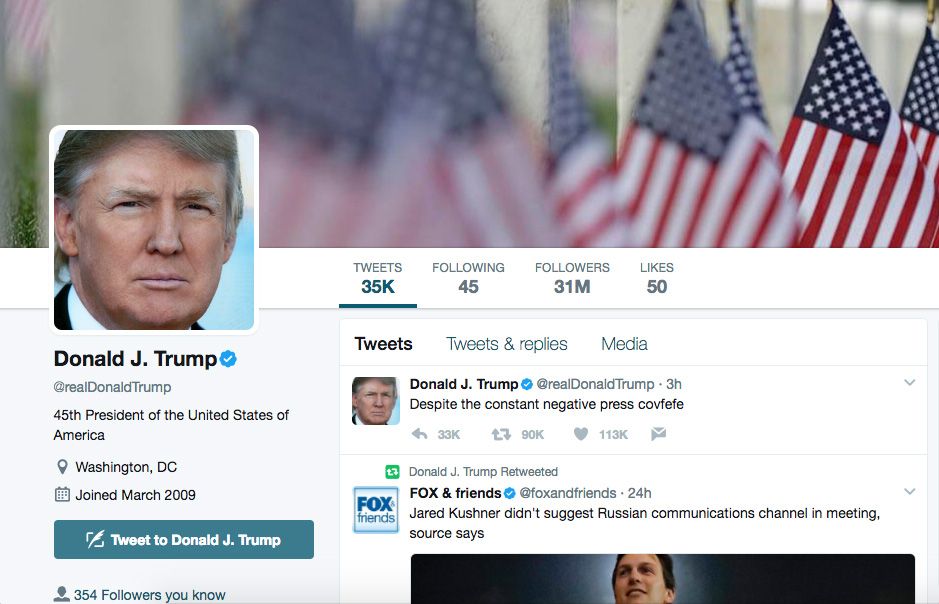
Not six months ago, there were fears that the United States was descending into authoritarianism. "Donald Trump is actually a fascist," opined Michael Kinsley in The Washington Post. The linguist and political theorist Noam Chomsky did him one better, making a comparison to Adolf Hitler that would become liberal cliché long before Trump took the oath of the presidency. People were going to move to Canada. Some had said so when George W. Bush was elected, and then elected again—but they were serious this time.
President Trump answered those worries shortly after midnight with a single word: "covfefe"
What does the word mean? Nothing at all. Trump was most likely trying to spell "coverage," though "covfefe" is an impressive misspelling of the word. It is not clear why he was tweeting at all so late into the night, why the tweet was aborted mid-sentence, or why that tweet remained on the president's feed for more than five hours, despite the worldwide derision it received as soon as it was posted.
In the early morning hours, Trump deleted the tweet, but then sent another shortly after 6 a.m., that seemed to wink at and encourage the speculation about his accidental neologism: "Who can figure out the true meaning of "covfefe" ??? Enjoy!"
what makes me saddest is that I know I'll never write anything funnier than #covfefe
— Jimmy Kimmel (@jimmykimmel) May 31, 2017
The utter nonsense of "covfefe" has already made it a meme sure to become American presidential lore, like FDR's fireside chats and JFK's speech at the Berlin Wall. Covfefe tattoos seem inevitable. So do covfefe cocktails, or even children named Covfefe. Some will make millions on ironic covfefe t-shirts. Billions, perhaps.
When the moon hits your eye like a big pizza pie that's #covfefe
— Joe Stepowski (@pompeyjoe80) May 31, 2017
Dismissing the social media craze over "covfefe" is easy enough. And bemoaning the frivolity of the internet is nearly as old as the first packet-switching technology. But something deeper is at work in the digital fascination over "covfefe," a kind of liberal self-soothing rooted in the conviction that a man who'd send a tweet is not going to launch nuclear weapons against a foreign adversary or turn the nation into a military dictatorship.
Trump falls asleep mid-tweet & the entire planet's now debating its 'meaning'.
— Piers Morgan (@piersmorgan) May 31, 2017
Must be such a laugh being @POTUS. #covfefe
It's true that George W. Bush was also the subject of widespread mockery, but there was no Twitter to turn his gaffes into memes and send the ricocheting around the world in a digital feedback loop that devours every presidential statement (and misstatement). Moreover, while he was disliked widely by Democrats, Bush was not nearly as loathed as Trump, especially not in the early years of his presidency: At one point after 9/11, Bush's approval rating hit 90 percent. Moreover, Bush had none of Trump's gigantic ego. If anything, he was often overshadowed by Vice President Dick Cheney, who seems acutely resistant to internet memes to this day.
Tuesday: "I wonder if anything weird is going to happen."
— Schrödinger's Trump: Kamala is your VP (@SchrodngrsTrump) May 31, 2017
Wednesday: "The Oxford English Dictionary Word of the Year is #covfefe."
The mockery of Trump is much more purposeful—and more therapeutic to those who remain unwilling to accept him as their president and are deeply concerned (rightly or wrong) about his direction for the nation. If "covfefe" means anything to his detractors, it is a sure sure sign that Trump is presiding over " an impressive amount of ineptitude," as David Brooks recently put it in a withering recent column about the Trump administration's "incompetence crisis."
"Covfefe" is an answer to all those who worried about the United States turning into Stalinist Russia. Tajikistan? Maybe. But even that would require sacrificing some weekend golfing at Mar-a-Lago, not to mention a laying-off the self-pitying tweets about tough coverage on CNN.
In a way, "covfefe" humanized Trump to supporters and opponents alike. Maybe he is a "dotty old racist," as Pod Save America co-host Jon Lovett calls him with something approaching affection, a senescent figure " whose thoughts are often just six fireflies beeping randomly in a jar " ( Brooks again ). As such, he is more worthy of pity than fright. "Covfefe" could even be a cry for help.
For those who support Trump, "covfefe" is proof that he is "human. He's real. He's just like us," as one right-wing commentator said. Who among us has never misspelled a word on Twitter? Who among us has not complained about smartphone keyboards? "Covfefe," then, is a sign of our shared humanity, the fallibility that no man or woman can efface.
As long as we have "covfefe," we will be all right. Maybe.
Uncommon Knowledge
Newsweek is committed to challenging conventional wisdom and finding connections in the search for common ground.
Newsweek is committed to challenging conventional wisdom and finding connections in the search for common ground.
About the writer
Alexander Nazaryan is a senior writer at Newsweek covering national affairs.





